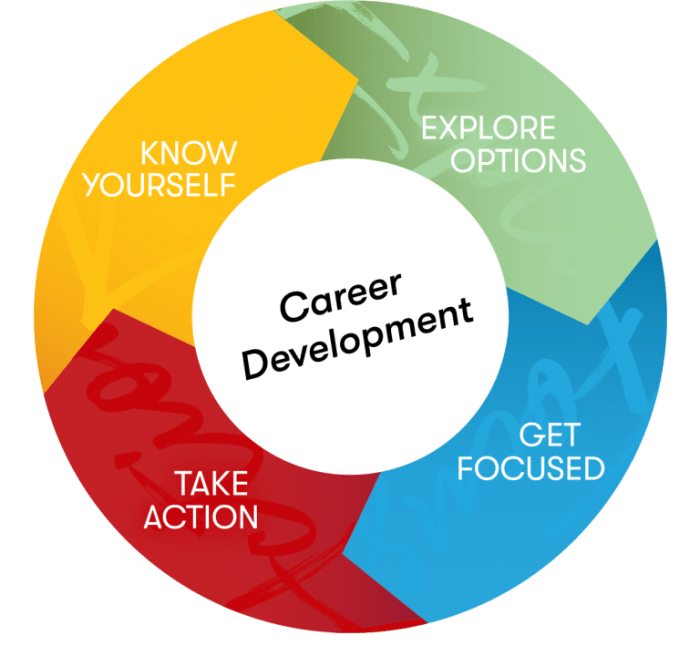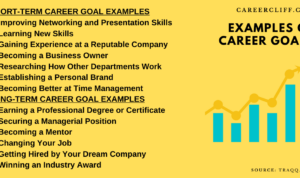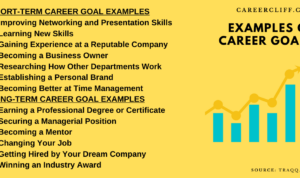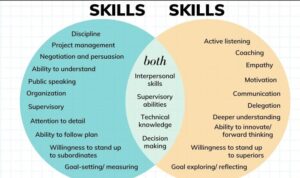Career Growth Strategies takes center stage, inviting readers into a world of professional development with a touch of swagger and style. Get ready to unlock your full potential and soar to new heights in your career.
Importance of Career Growth Strategies

Implementing effective career growth strategies is crucial for professional development as it helps individuals navigate their career path, set goals, and make progress towards achieving success.
Enhanced Professional Development, Career Growth Strategies
Career growth strategies can impact an individual’s success in their field by providing them with a roadmap for skill development, networking opportunities, and career advancement. By setting clear goals and actively working towards them, professionals can continuously improve their knowledge and expertise, ultimately leading to greater opportunities for growth and advancement.
Successful Examples
- Sheryl Sandberg: The COO of Facebook is known for her strategic career moves, including her time at Google and her advocacy for women in leadership roles.
- Elon Musk: The CEO of Tesla and SpaceX has demonstrated a strong focus on innovation and continuous learning, allowing him to excel in multiple industries.
- Oprah Winfrey: The media mogul’s career growth strategies, such as building her own brand and expanding her reach, have led to her immense success and influence.
Types of Career Growth Strategies
In order to advance in your career, it is important to utilize various strategies that can help you reach your goals. Different types of career growth strategies include upskilling, networking, goal setting, and more. Each of these strategies plays a crucial role in helping individuals progress in their careers.
Upskilling
Upskilling involves continuously improving your skills and knowledge in your field. This could mean taking courses, attending workshops, earning certifications, or pursuing advanced degrees. By upskilling, you not only stay current in your industry but also demonstrate to employers your commitment to professional development.
Networking
Networking is another key strategy for career growth. Building relationships with colleagues, mentors, industry professionals, and potential employers can open doors to new opportunities. Networking allows you to learn from others, gain insights into different career paths, and increase your visibility in your field.
Goal Setting
Setting clear and achievable goals is essential for career growth. By defining what you want to achieve and creating a roadmap to reach those goals, you can stay focused and motivated. Goal setting helps you measure your progress, make necessary adjustments, and celebrate your accomplishments along the way.
Combining Strategies for Optimal Results
While each of these strategies is valuable on its own, combining them can lead to even greater success. A well-rounded approach that incorporates upskilling, networking, goal setting, and other strategies can help you maximize your potential and advance your career more effectively. By diversifying your efforts, you increase your chances of achieving your professional goals.
Developing a Personalized Career Growth Plan
Creating a personalized career growth plan is crucial for individuals to achieve their professional goals and aspirations. By tailoring the plan to specific needs and objectives, one can set a clear path towards success in their career journey.
Setting Short-term and Long-term Career Objectives
- Start by identifying short-term goals that can be achieved within a year or less. These goals should be specific, measurable, achievable, relevant, and time-bound (SMART).
- Next, define long-term objectives that align with your ultimate career vision. These goals may take several years to accomplish and should serve as milestones towards your overarching aspirations.
- Setting both short-term and long-term objectives helps in maintaining focus, motivation, and direction in your career growth journey.
Regularly Reviewing and Adjusting Career Growth Plan
- It’s essential to regularly review your career growth plan to assess progress, identify areas for improvement, and make necessary adjustments.
- Set aside dedicated time intervals, such as quarterly or bi-annual reviews, to evaluate your goals and performance against them.
- Be open to adapting your plan based on changing circumstances, new opportunities, or evolving career interests. Flexibility is key to ensuring your plan remains relevant and effective.
Overcoming Challenges in Career Growth: Career Growth Strategies

In the pursuit of career growth, professionals often encounter various challenges that can hinder their progress. It is essential to identify these obstacles and find effective ways to overcome them in order to achieve success in one’s career journey.
Lack of Resources
- One common challenge professionals face is a lack of resources, whether it be financial, informational, or technological.
- To overcome this obstacle, individuals can seek out alternative sources of support, such as networking with industry professionals, leveraging online resources, or pursuing further education to acquire new skills.
- For example, a marketing professional looking to advance in their career may lack the resources to attend expensive conferences. Instead, they can join online communities, participate in webinars, and connect with experts through social media to stay updated on industry trends.
Time Constraints
- Another challenge professionals face is time constraints, juggling work responsibilities, personal commitments, and pursuing career growth simultaneously.
- To overcome this obstacle, individuals can prioritize tasks, delegate responsibilities where possible, and establish a well-structured schedule to manage their time effectively.
- For instance, a working parent aiming for career advancement may face time constraints due to family obligations. By setting aside specific time slots for career development activities and seeking support from family members, they can create a balance that allows for growth.
Fear of Change
- Many professionals struggle with a fear of change, whether it involves stepping out of their comfort zone, transitioning to a new role, or taking risks in their career.
- To overcome this obstacle, individuals can focus on building their confidence, seeking guidance from mentors or career coaches, and gradually exposing themselves to new challenges to overcome fear.
- For example, an individual hesitant to pursue a leadership position due to fear of failure can start by taking on small leadership responsibilities within their current role and gradually expanding their scope to build confidence and overcome the fear of change.




